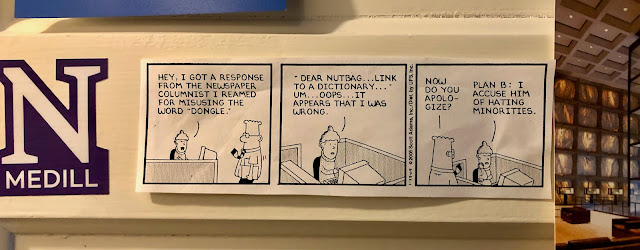 |
The Triumph of Fame, by Giovanni di ser Giovanni Guidi (Metropolitan Museum of Art) |
Did you wake up Wednesday morning with a wincing unease that could be unwound as, "Gee, I'm glad Lori Lightfoot lost. But Paul Vallas? Really? He's the best we've got?"
Thinking to ward off this sour feeling with information, I plunged into the archive, looking for what I've written about Vallas. The short answer is: not much. A reformer turned hired gun traveling bureaucrat, he was good at signing pledges like the one mocked below. A pledge that Vallas blithely violated, at least the "I will discourage all forms of prejudice by others at every opportunity" clause, when he allowed the caustic Fraternal Order of Police to climb into bed with him without a murmur of protest. The fact that Vallas felt obligated to put some daylight between himself and Gov. Ron DeSantis when the Florida fascist came to town says everything. I like to think this all means Chicago will welcome Mayor Brandon Johnson come May. But if we've learned anything, it's that we minimize the Aggrieved White Person vote at our peril.
Chicago is the most segregated city in America. They leave that off the brochures. No Southern backwater ever managed to balkanize the races as completely as Chicago has, first as a matter of official policy, and now as lingering tradition.
So it was with more than the usual weary, ironic reporter's smile that I tore open an envelope from the city this morning and found my very own copy of the "Metropolitan Chicago Pledge," the Commission on Human Relations' latest attempt to justify its existence.
First, to work us into a signing frenzy, the pledge bandwagon is rolled out and put on display: Mayor Daley has already signed. Cook County Board President John H. Stroger Jr., too. Ditto for Paul Vallas, the head of the public schools.
I'm not sure whom that's supposed to impress. Now if Matt Hale or Lu Palmer had signed, that might signify something dramatic was afoot. But no.
The pledge itself is a masterpiece of early 21st Century touchy-feeliness. It begins with three sentences, two simple ones and one tongue-twister that might have been crafted by the mayor himself.
"I believe that every person has worth as an individual," it begins. "I believe that every person is entitled to dignity and respect." And then the Daleyian doozy: "I believe that every thought and every act of prejudice is harmful; if it is my thought or act, then it is harmful to me as well as others."
Then the call to action:
"Therefore, from this day forward I will strive daily to eliminate all forms of prejudice from my thoughts and actions. I will discourage all forms of prejudice by others at every opportunity. I will treat all people with dignity and respect; and I will strive daily to honor this pledge, knowing that metropolitan Chicago will be a better place because of my effort."
Golly.
The city plans to distribute this travesty to "youth-service agencies, places of worship, corporations, and businesses," in the form of "posters, bookmarks, and wallet-size cards." This is just hobbyhorsing — and given the endless meetings and discussions (whoops, make that dialogues) that no doubt went into this effort, not to mention the printing and postage, every Chicagoan has a right to greet it with a thumb to the nose, a wiggle of the fingers, and a moist blat of ridicule.
Is there any reason we should accept this bit of empty symbolism from the same city that erected the nightmare housing projects we are still struggling to free ourselves from? The same city whose city council voted to ban Martin Luther King Jr.'s open occupancy marches 49 to 1? Of course not.
The true insult behind the pledge is that racism is a deep, institutional problem, the sort of evil that surface do-goodism has no effect on whatsoever. Can anyone not in the direct employ of the department of human relations believe that any shred of racist feeling will be diminished because of this pledge? Impossible.
And we haven't even begun to address the long, scary history of pledges and oaths of all forms. They're fine to inculcate patriotism in 6-year-olds, but after that they are usually studies in coercion and hypocrisy.
We laugh at those old duck and cover civilian defense films from the 1950s because of their woefully inadequate understanding of the problem being faced. Just as curling up under your desk is of no use when the hydrogen bombs start falling, so weak albeit well-intentioned efforts such as this current travesty mock the seriousness of the problems they pretend to address.
—Originally published in the Sun-Times, Feb. 17, 2000.






